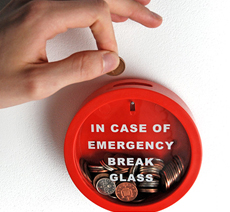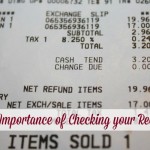An emergency fund is an account that is used to set aside funds to be used in an emergency.
The purpose of the fund is to improve financial security by creating a safety net of funds that can be used to meet emergency expenses as well as reduce the need to use high interest debt, such as credit cards, as a last resort. source
There are many aspects of an emergency fund, and even more questions that surround it. How much should I have? How should I store it? For what is an emergency fund to be used?
The amount of your emergency fund will vary from family to family. The basic minimum amount your fund should have is 6 months living expenses. Yes, I said minimum!
Think of it this way: if the family’s main breadwinner was unable to work (for whatever reason), how would you pay your bills? How would you eat? With 6 months living expenses set aside, work would not have to be immediately found.
I know it seems like a lot, but you do not have to come up with it all at once; this is something you will built up too.
As for storing your emergency fund, the money needs to be easily-accessible. This is not something you are investing and looking for a huge return. You want your money to be liquid (a’la Dave Ramsey); right there when you need it.
My husband and I have our emergency fund in a savings account, where we make a bit on interest every year, but the money is only a transfer away, if need be.
Reasons to have an emergency fund.
:: The car breaks down.
:: A trip to the emergency room.
:: Emergency/unplanned surgery.
:: Job loss.
:: An injury to one of the income providers.
An emergency fund would have come in handy in 2003 when I had to have emergency gallbladder surgery. Not only did I have to pay for the surgery, but I had to pay for my MAJOR allergic reaction to the anesthesia (that happened before the surgery, of course). I basically paid for one surgery and two surgery preps, plus 2 different anesthesias.
What an emergency fund is NOT for.
:: Vacations
:: New tires for the car
:: Tuition
:: A new vehicle just because you want it
These are all called “planned” events. If you have a car, you will eventually need to replace the tires. Plan accordingly. Vacations should also be planned for in advance, using their own special fund. If you have children, more than likely they will need funds for school tuition sometime in the future.
When to implement the usage of an emergency fund.
:: Groceries {ole’ Dave likes beans-and-rice}
:: Heating your home
:: Getting to work (however need be)
:: Medical necessity or emergency
Now, these are going to be different for every family. Remember, these are simply guidelines, not the “rules,” and any decisions regarding the emergency fund need to be discussed BEFOREHAND with everyone involved.
After you reach the allotted 6 month minimum, do not stop there! You can continue to build upon that, or begin saving for other things like that vacation I won’t let you spend your emergency fund on, a home, a new car, etc.
Do you have an emergency fund? What would you use it on, if needed?
photo credit: endlessstudio







We had an emergency fund that came in quite handy when our home flooded from a plumbing problem this winter. Our fund was just almost depleted after paying the plumber and having the floors replaced, but boy am I happy we had the funds to make those repairs!!
.-= Jessica´s last blog ..Pink and Brown Baby Girl Quilt =-.
Sad to say, we have never had the “minimum” amount put back, but we did have a significant amount saved prior to all of our unemployment issues over the last two years. We are currently attempting to pay off our debt and begin to build our fund up again. Thanks for the pointers! 😉
.-= Mandy Roberson´s last blog ..A New Adventure =-.